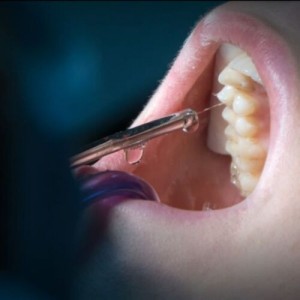
Music therapy, virtual reality to manage anxiety and pain in dental surgery
Lara Figini
Oral surgery procedures usually cause a high level of anxiety in patients, which can lead to increased pain sensation, as well as acute changes in the autonomic nervous system during the surgical procedure.
The use of analgesic drugs and performing these procedures under sedation or general anesthesia are the preferred approaches to reduce such emotional stress issues.
However, these procedures come with certain risks, side effects, and complications.
To mitigate the effects of anxiety, alternative techniques have been studied, such as psychological distraction through interventions to control anxiety and perioperative pain, which do not involve any risk for the patient.
Music therapy and virtual reality (VR) are some of these methods.
Music therapy involves the use of music to achieve therapeutic goals: the achievement, maintenance and improvement of mental and physical health. Relaxing music that mimics natural sounds, for example, can decrease sympathetic nervous arousal.
Virtual reality, on the other hand, is a procedure that allows the real-time simulation of an environment with which users can intuitively interact through multiple sensory channels. VR manages to create an illusion of presence in virtual environments that allow patients to immerse themselves in a simulated world.
Materials and methods
In a randomized controlled trial published in January 2023 in the Journal of the American Dental Association, the authors evaluated the effect of virtual reality (VR) and music therapy on peri-operative anxiety and pain in patients undergoing extraction of impacted third molars.
A total of 275 patients were evaluated in the study and divided into three groups:
- Group 1, music therapy intervention group (n = 91)
- Group 2, VR virtual reality intervention group (n = 93), and
- Group 3, control group (n = 91) no alternative method adopted.
The Spielberger State-Trait Anxiety Inventory and visual analog scale of pain intensity were adopted for assessments in this study.
Results
Patients in the music therapy and VR groups showed a greater reduction in anxiety level after third molar extraction surgery (total anxiety reduction in the music group: 15.12; 95% CI, 13.16 to 17.08; Rosenthal r, 1.61; P < .001; reduction in total anxiety in the VR group: 9.80; 95% CI, 7.66 to 11.95; Rosenthal r, 0.97; P <.001; reduction in total anxiety in the control group: 9.80; 95% CI, 7.66 to 11.95; Rosenthal r, 0.97; P <.001).
Pain intensity after surgery was lower in patients in the music therapy group than in patients in the control group (P = .04). After the intervention, patients in the music therapy and VR groups had a significant decrease in systolic blood pressure (P < .05), diastolic blood pressure (P < .05), and heart rate (P < .05) compared to the control group.
Conclusions
From the data of this study, it can be concluded that music therapy and virtual reality during dental treatments for the extraction of third molars reduce anxiety and even improve the patient's physiological parameters.
For more information: "Effect of virtual reality and music therapy on anxiety and perioperative pain in surgical extraction of impacted third molars."
 Related articles
Related articles
Oral pathology 03 June 2024
Stress and anxiety are emotional states that often accompany patients who have to receive dental treatments, leading them to postpone or avoid treatments with the consequent deterioration of their...
Oral pathology 04 April 2021
Preoperative receptive music therapy in oral oncologic surgery: preliminary study
Authors:Fabio Dell’Olio, Pantaleo Lorusso, Irene Sorrentino, Filippo Giordano, Saverio Capodiferro, Angela Tempesta, Luisa Limongelli, Maria Massaro, Filomena Puntillo, Nicola Brienza, Gianfranco Favia1
The diagnosis of oral cancer causes anxiety and fear to the patient undergoing to the surgery under general anesthesia, and could affect negatively the peri-operative period rising blood pressure and...
By Drew Hansen, Indiana University News
Dr. Vinicius Dutra has developed a virtual reality radiology training for oral health providers, designed to address both the high cost of radiology training and the low interest of many dental...
Oral Hygiene & Prevention 01 November 2022
Virtual reality exposure therapy has been used to treatment different phobia subtypes, including phobia of dental treatments.
The present study investigated the effects of dental anxiety and dental visits on oral hygiene practices, which included brushing, lossing and amount of time brushing.
 Read more
Read more
Editorials 10 October 2025
With proud smiles and crisp white coats, ninety-three learners from the DDS Class of 2029 and the International Dentist Pathway Class of 2028 marked the start of their dental careers at the UCSF...
Periodontology 10 October 2025
Continuous professional development (CPD) in Periodontology refers to the overall framework of opportunities that facilitate a life-long learning practice, driven by the learner-practitioner and...
TheraBreath, the #1 alcohol-free mouthwash brand in the U.S.*, has introduced a new line of dentist-formulated, clinically tested toothpastes designed to support professional oral care...
News 10 October 2025
New officers and trustees were installed at the Minnesota Dental Association’s Leadership Conference on September 19 in Minneapolis.
News 10 October 2025
Smartee Denti-Technology today announced that Professor Gang Shen, its Chief Scientist and Executive President of TaiKang ByBo Dental, has once again been named to the World’s Top 2% Scientists...















